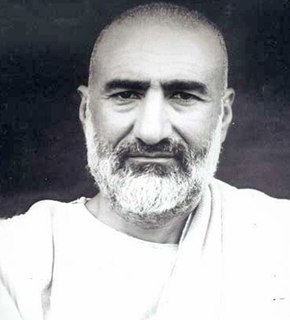A Quote by Georg Wilhelm Friedrich Hegel
The beginning of religion, more precisely its content, is the concept of religion itself, that God is the absolute truth, the truth of all things, and subjectively that religion alone is the absolutely true knoweldge.
Related Quotes
True religion is not talk, or doctrines, or theories, nor is it sectarianism. It is the relation between soul and God. Religion does not consist in erecting temples, or building churches, or attending public worship. It is not to be found in books, or in words, or in lectures, or in organizations. Religion consists in realization. We must realize God, feel God, see God, talk to God. That is religion.
Art is not a substitute religion: it is a religion (in the true sense of the word: 'binding back', 'binding' to the unknowable, transcending reason, transcendent being). But the church is no longer adequate as a means of affording experience of the transcendental, and of making religion real - and so art has been transformed from a means into the sole provider of religion: which means religion itself.
It is not given to man to know the whole Truth. His duty lies in living up to the truth as he sees it, and in doing so, to resort to the purest means, i.e., to non-violence. God alone knows absolute truth. Therefore, I have often said, Truth is God. It follows that man, a finite being, cannot know absolute truth. Nobody in this world possesses absolute truth. This is God's attribute alone. Relative truth is all we know. Therefore, we can only follow the truth as we see it. Such pursuit of truth cannot lead anyone astray.
The very fact that religions are not content to stand on their own feet, but insist on crippling or warping the flexible minds of children in their favour, forms a sufficient proof that there is no truth in them. If there were any truth in religion, it would be even more acceptable to a mature mind than to an infant mind--yet no mature mind ever accepts religion unless it has been crippled in infancy.
No religion is absolutely perfect. Yet not only do we fight for religion, but also are we often willing to sacrifice our lives for it. And what we hopelessly fail to do is to live it. A true religion is that which has no caste, no creed, no colour. It is but an all-uniting and all-pervading embrace.
Interest in religion is not necessarily interest in God. Religion in public life means a set of ideas, an ideology that has certain positions. Religion is then one more ideology among others. Religion is about God. Religion begins with a relationship to God, not a relationship to an idea. It is God who is an actor, not just individuals who have certain beliefs who are actors. God is an actor.
Subjective reason ... is inclined to abandon the fight with religion by setting up two different brackets, one for science and philosophy, and one for institutionalized mythology, thus recognizing both of them. For the philosophy of objective reason there is no such way out. Since it hold to the concept of objective truth, it must take a positive or a negative stand with regard to the content of established religion.
When I approached God at that time, I hardly had a living faith in Him. The agnostic was in me, the atheist was in me, the sceptic was in me and I was not absolutely sure that there was a God at all. I did not feel His presence. Yet something drew me to the truth of the Vedas, the truth of the Gita, the truth of the Hindu religion.
Religion has ever filled the mind of man with darkness, and kept him in ignorance of his real duties and true interests. It is by dispelling the clouds and phantoms of religion, that we shall discover truth, morality and reason. Religion diverts us from the causes of evils, and from these remedies which nature advocates, far from curing; it only aggravates, perpetuates and multiplies them.
Evolution is promoted by its practitioners as more than mere science. Evolution is promulgated as an ideology, a secular religion - a full-fledged alternative to Christianity, with meaning and morality. I am an ardent evolutionist and an ex-Christian, but I must admit that in this one complaint - ...and Mr. Gish is but one of many to make it - the literalists are absolutely right. Evolution is a religion. This was true of evolution in the beginning, and it is true of evolution today.








































